Project
Injecting New Life into Cellulosic Ethanol Production
We bridge the gap to economically feasible fuel ethanol from Nordic renewable and sustainable forest-based residues.
Our objective is to further develop and optimize the novel CoRyFee fermentation concept for lignocellulosic ethanol production and demonstrate its feasibility in a near-industrial scale. Being feedstock-agnostic, the technology will enable use of soft-and hardwood, feedstocks that cannot currently be effectively utilized by any available technology.
Three Nordic companies have come together for the NewLiEP project to help answer the demand for more sustainable fuels in the transportation sector, which is still heavily reliant on fossil fuels. We will prepare the concept for commercialization through the involvement of potential customer and introduce to the market an economically feasible concept for sustainable fuel ethanol production.
Expected benefits:
- Increase in productivity of a given fermentation facility by more than 100 % compared with current state of the art as a result of employing a novel continuous fermentation strategy and control system.
- Efficient use of hitherto non-fermentable material is enabled by utilizing biomass hydrolysate with more than twice the amount of inhibitory compounds with help of inhibitor relief technology and yeast optimised to higher inhibitor level;.
- Reduction of yeast inoculum by more than 80 % compared to current state of the art as a result of using a more efficient yeast strain and a novel continuous fermentation strategy.
- Higher production rate of the process and a higher level of automatization compared with current state of the art.
- Decrease in trained personnel required to run and control the entire ethanol fermentation process.
- Reduction in capital expenditure of the fermentation unit by at least 50% due to lower volume requirements during ethanol production.
Technology
CoRyFee – Cost Reduction in Yeast Fermentation for Commercial Production of Cellulosic Ethanol
The CoRyFee concept takes advantage of a newly developed fermentation monitoring and control strategy, which makes it possible to keep the fermentation conditions at a “sweet spot”, thus allowing for optimal ethanol productivity and increased yields. In addition, the fermentation can be performed in continuous operation without fresh addition of yeast after the initial inoculum has been added to start the fermentation process.
The CoRyFee concept is the subject of a joint patent application filed by Terranol A/S and SEKAB E-Technology AB as of 2018. The concept has at this point in time been demonstrated at fermentation scale of 10.000L fermentation volume with 50.000L of hydrolysate being fermented at 95 percent ethanol yield at the Biorefinery Demo Plant in Örnsköldsvik, Sweden. Continuous fermentation operations of 21 days without interruption and without addition of yeast after the initial fermentation have been demonstrated. The technology is suitable for any type of fermentation process regardless of fermenting organism and fermentation product.
Main improvements of the CoRyFee concept compared to standard fermentation technologies:
Significantly improved yeast economy due to a 20-fold lower yeast utilization compared to batch fermentations with similar throughput.
6-fold increase in volumetric ethanol productivity compared to batch fermentations.
Stable and continuous 95 percent yields form sugar to ethanol.
50 percent lower investment cost due to reduced need for tank volume, cleaning, and sterilization.
Increased tolerance towards an array of inhibitors released by the pre-treatment process from sugar and lignin degradation.
Partners

Terranol A/S is a Danish industrial biotechnology company providing yeast strains and fermentation technology for the 2G bioethanol industry and extensive assistance when it comes to implementing into large-scale production processes. Competencies in process up scaling has been demonstrated from 2L and up to 270.000L scale with results and performance that closely resemble each other.
Birgitte Rønnow

Kanteleen Voima is a Finnish electricity producer established in 2006 and owned by Finnish energy companies. Kanteleen operates a power plant at Haapavesi which currently uses peat as main fuel. The company is planning to invest in a bioethanol plant, project Nordfuel, with an annual output of 65.000 tonnes of ethanol converting renewable and sustainable forest-based residues to ethanol.
Teija Mäyrä

SEKAB E-Technology AB is one of Europe´s leading ethanol players and is responsible for the operation of the Biorefinery Demo Plant in Örnsköldsvik, Sweden. SEKAB E-Technology has developed certain know-how, patents, processes and proprietary technologies for the production of fermentable sugars, lignin and ethanol from a variety of lignocellulosic biomass under the technology platform called CelluAPP®.
Adnan Cavka

This project has received funding from the European Union’s Horizon 2020 Research and Innovation programme under grant agreement No 869879.
News
Trials in the Biorefinery Demo Plant in Örnsköldsvik, Sweden completed
January, 2022
By combining CelluApp for processing biomass and the CoRyFee fermentation concept on woody materials it has been demonstrated that the overall bioethanol production process can be successfully applied in an industrial and commercial context. A video is released:
Pamphlet now available
March, 2021
The NewLiEP project has released a pamphlet for download.
Fermentation trials conducted
June, 2020
Fermentation trials on woody materials from Kanteleen Voima pre-treated and enzymatically hydrolysed by SEKAB have been conducted by Terranol.
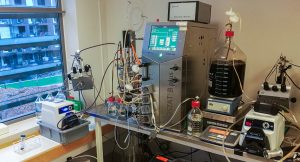
The complete CoRyFee setup in lab-scale.
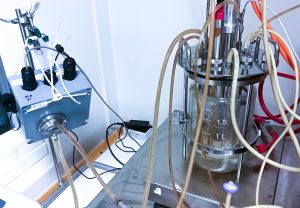
The RI detector – an essential part of the CoRyFee.
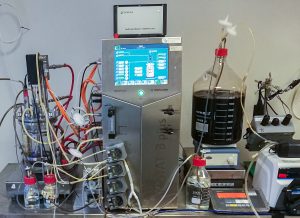
The fermenter and feed-bottle setup in the lab.
Continuous fermentation employing the CoRyFee real-time monitoring and control strategy and Terranol's C5/C6 fermenting yeast was demonstrated using a combination of pre-treated and hydrolyzed spruce, pine and birch. Parameters investigated were e.g. optimization of needed growth factors.
Pre-treatment and hydrolysis initiated
February, 2020
First pre-treatments and hydrolysis trials on woody material from Kanteleen Voima have been conducted by SEKAB in the Biorefinery Demo Plant (BDP) in Örnsköldsvik, Sweden.
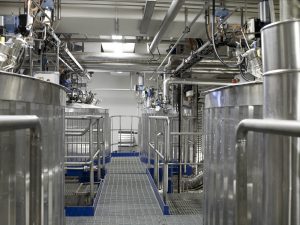
Interior of BDP
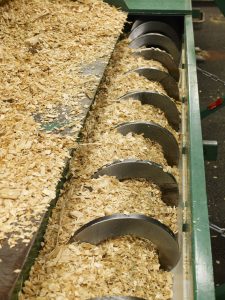
Feeding of wood chips to pre-treatment reactor
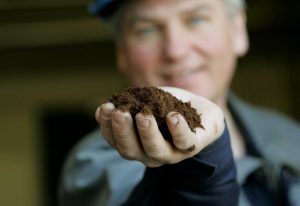
Pre-treated wood chips
Various pre-treatments with dilute acid and steam have been performed on forestry and sawmilling material. Hereby, sugars are released from hemicellulose and cellulose is made accessible for the subsequent enzymatic hydrolysis. Both separate fractions and mixtures have been investigated and efficiencies and differences evaluated.
First shipment of raw materials
October, 2019
The first truck load of raw materials was shipped from Kanteleen Voima (Haapavesi, Finland) to SEKAB (Örnsköldsvik, Sweden) for small scale pre-treatment and hydrolysis testing.
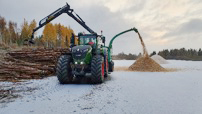
Chipping of raw materials
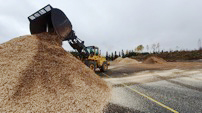
Mixing of chips
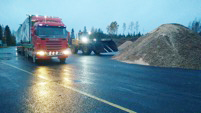
Loading of the truck
The truck was loaded with approx. 37 tons sawdust-wood chips mixture: sawdust, sawmill chips, delimbed stem wood chips, whole tree chips and forest residues chips. Chosen raw materials were collected around the planned biorefinery site and chipped into adequate size of chips. Next, mixing of the chips was done, loaded in the truck and shipped to Örnsköldsvik. Moisture and chemical composition analyses were conducted.
NewLiEP project kicks off
August, 2019